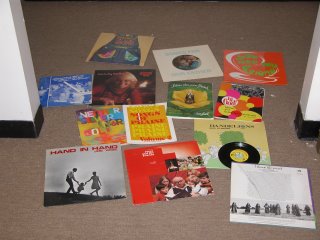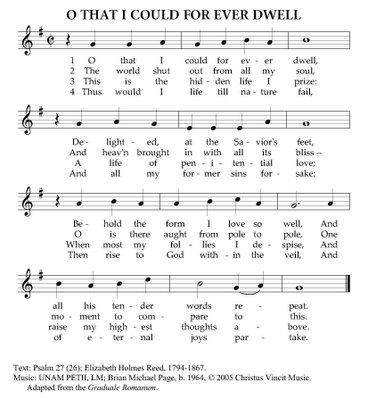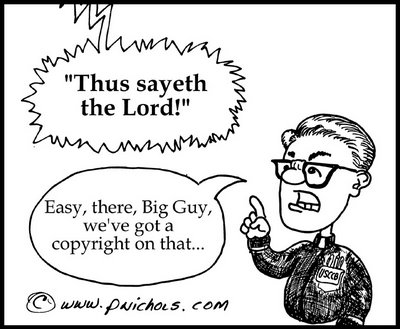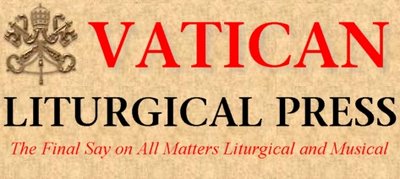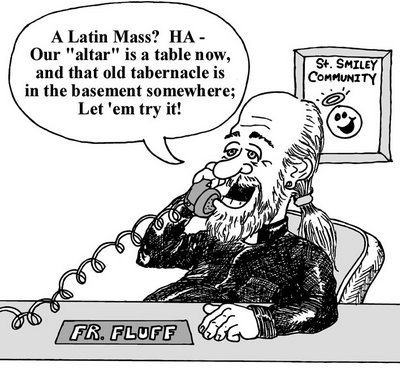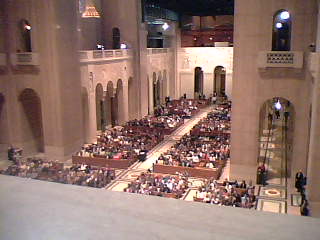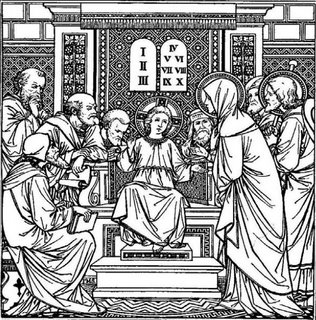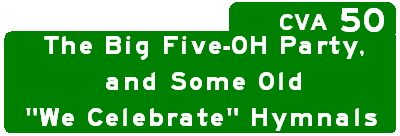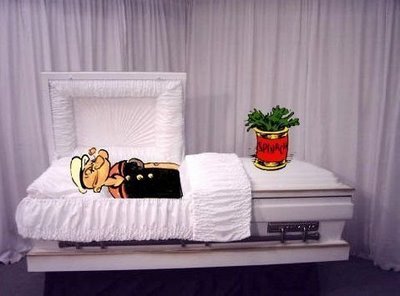Bishop Morlino added to list of BMP's favorite bishopsGot this from one of our
RPInet friends. Went to blog on it last night and Blogger wouldn't let me.
Argent has a post on it as well. But anyhoo, Bishop Morlino of Madison, WI,
wrote this for his diocesan paper. This puts Bp. Morlino amongst the ranks of some of my favorite US Bishops (along with Bp. Finn of KC-St. Joseph, Bp. Slattery of Tulsa, and Abp. Burke of St. Louis).
Enjoy!
Peace,
BMP
________________________________________________
(This communication was sent directly to all priests and deacons in the Diocese of Madison, as well as to the local parish directors of worship and directors of music.)Dear Friends,
The clear teaching of the Second Vatican Council is that the presence of Christ at Mass occurs in four different ways: the most sacramentally intense presence of Christ is His Real Presence under the signs of bread and wine; the second most sacramentally intense presence of Christ is in His proclaimed word; the third most sacramentally intense presence of Christ is through the priest, who is ordained to act in the person of Christ; and the fourth most sacramentally intense presence of Christ is in the assembly. These four "places" of the presence of Christ are all important but they are not all equal in sacramental intensity.
Misinterpretation of council teachingsIn previous communications, I have written about what Pope Benedict has called the discontinuity hermeneutic, that is the various misinterpretations of the teachings of the Second Vatican Council, which have occurred since the council and which now stand in need of correction.
After the council, an overemphasis was given to the presence of Christ in the assembly, so that the other ways Christ is even more sacramentally intensely present suffered a certain neglect.
Evidence of that is given through the occurrence, not unusual throughout the United States, of the practice of the taking of the consecrated Precious Blood of Christ, which remained after Mass, and pouring it down the sacrarium or even an ordinary sink. Evidence of this is also given in the need seen universally among the Bishops of the United States to issue a document affirming and clarifying our belief in the Real Presence of Christ in the Eucharistic species.
As I have said repeatedly, everything that we do or do not do at the Eucharistic liturgy teaches. Pope Benedict has called us recently to a reflection about the music that is sung during the liturgy, and in fact our national bishops' conference will be considering this matter further at our coming meeting in November.
Music during the MassThe question arises, does some of the music routinely sung embody the incorrect overemphasis on the presence of Christ in the assembly, so that people are confused as to the importance of the sacramental intensity of His presence, especially under the signs of bread and wine.
Certain songs come to mind where the lyrics raise a real question for me. For example: "
We are called,
We are chosen,
We are Christ for one another,
We are a promise,
We are sower,
We are seed,
We are question,
We are creed." Singing that song repeatedly teaches people something, and I am afraid that it is something that I as Bishop do not want to teach them, but we certainly need to begin a dialogue about these matters.
Another example of this same problem would be the lyrics of the hymn
Gather Us In, where a seemingly endless explanation is given to God about who We are, who are gathered in.
Pope Benedict has said that the music at Mass is not an extrinsic accompaniment to the liturgy, but is intrinsically part of our prayer of praise and adoration and thanksgiving to the Lord. The words of the songs we sing should be focused on giving praise and adoration to the Father, to the Son and to the Holy Spirit, rather than explaining to God things about ourselves or even praising ourselves.
When we gather for the Eucharist, we gather as sinners as the beautiful Eucharistic Preface teaches: "You have no need of our praise, yet our desire to thank You is itself Your gift. Our prayer of thanksgiving adds nothing to Your greatness, but makes us grow in your grace, through Jesus our Lord." That prayer of the Church contains the truth about the assembly. We are an assembly in whom Christ is indeed present, an assembly blessed with this wonderful gift even though we are sinners. The music we sing at Mass should teach nothing different than that.
Open discussion about music at MassI make these observations in order to open a discussion about the music we sing at Mass, in the context of my addressing my second focal point since coming to Madison (vocations has been the first focal point), of liturgy and catechesis. This is just the beginning of a discussion. I will in the near future be issuing additional guidelines for music at celebration of Confirmation only (which will take effect next Easter), and any further liturgical approaches that we take as a diocese will depend on the continuing wisdom which Pope Benedict offers us about liturgical music, on the wisdom we receive from our deliberations as a National Conference of Bishops, and upon the reflections I hear from our good priests and people in the days ahead.
But I write this present communication in the hope that pastors and brother priests, deacons, and various liturgical ministers in the parishes will begin to reflect on and discuss this particular important matter, so that the liturgical prayer of our people will be more integral with and more expressive of authentic spirituality and theology, and as a result our faithful people who pray that prayer will be even more holy than so many of you already are.
We must remember that as we pray before the "Holy, Holy, Holy," the angels and saints are present with us giving praise to the Trinity. The hymns we sing should be worthy of the participation of the angels and saints.
Thank you for reading this, God bless you and yours. Praises be Jesus Christ!
It is my pleasure, Your Excellency! - BMP




